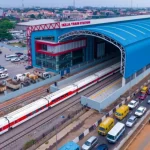
Ajaokuta a Monumental Failure, $11bn Spent Over 43 Years Without Producing Any Steel – Sen. Jimoh

Senator Jimoh Ibrahim has revealed that Nigeria has a staggering 11,866 abandoned mega projects, each representing missed opportunities for national development.
Among these, the Ajaokuta Steel Complex stands out as a prominent example of squandered potential, with $11 billion spent over 43 years without producing a single ton of steel.
The senator, who represents Ondo South Senatorial District, made these remarks during an interview with The Punch on Monday, following his participation in the 2024 Oxford Major Programme Management conference.
Ajaokuta has been left idle for 43 years despite the enormous investment,” Ibrahim said, pointing to the mismanagement and inefficiency that has plagued infrastructure projects in Nigeria.
He argued that completing such projects could elevate the country to development levels comparable to the United Kingdom.
Ibrahim highlighted the need for a paradigm shift in project management practices to avoid further waste of resources, emphasising that the failures of the past should be reframed as opportunities for sustainable development.
Acknowledging corruption as a critical issue, the senator noted that it is a global challenge, not unique to Nigeria. Drawing comparisons, he cited cost overruns and delays in the UK’s Crossrail project, which ballooned from £14.8 billion to £18.7 billion, and the U.S. government’s $65 billion loss on Nevada’s Yucca project, which remains incomplete.
He called on the Tinubu administration to prioritise the completion of abandoned projects, urging the government to designate unused initiatives as “National Failed Projects” and to revive key ones.
According to him, operational mega projects are essential for fostering national unity and addressing Nigeria’s ethnic diversity.
Read Also: Lagos Govt Suspends Red Line Train Operations Indefinitely, Cites Mechanical Issues
He praised initiatives like the Akpabio Stadium, former President Jonathan’s railway project, and the Abuja and Lagos airports as examples of projects that have positively impacted national cohesion.
About The Author
Related Articles
Ivory Coast to Buy Unsold Cocoa to Support Farmers
Ivory Coast has announced a government plan to purchase unsold cocoa stock...
ByWest Africa WeeklyJanuary 23, 2026Ghana Moves to Reclaim Kwame Nkrumah’s Former Residence in Guinea
Ghana has embarked on a diplomatic and cultural initiative to reclaim the...
ByWest Africa WeeklyJanuary 23, 2026Senegal Honors Players and Coach After AFCON Triumph
Senegal has formally honored its Africa Cup of Nations winning team, awarding...
ByWest Africa WeeklyJanuary 23, 2026Burkina Faso, Mali, and Niger Turn to Russia for Shared Telecom Network
Burkina Faso, Mali, and Niger have announced plans to develop the Sahel’s...
ByWest Africa WeeklyJanuary 23, 2026












Leave a comment